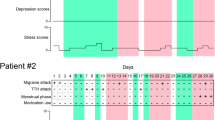Abstract
Migraine is an episodic brain disorder that results in significant morbidity. Antiepileptic drugs (neuromodulators) are increasingly recommended for migraine prevention because of placebo-controlled double-blind trials that prove them effective. Cortical spreading depression (CSD) is thought to be the pathophysiological correlate of the neurological symptoms in migraine with aura and neuromodulators may act on mechanisms involved in the initiation of CSD itself. Inhibition of trigeminocervical complex directly, or neurons that modulate sensory input, are also plausible mechanisms for the actions of neuromodulators in preventive therapy in migraine. Although it is unlikely that a single phenomenon serves as the only link between migraine and epilepsy, the neuronal hyperexcitability that may contribute to each condition may explain the effect of these drugs for both conditions.
Similar content being viewed by others
Author information
Authors and Affiliations
Corresponding author
Rights and permissions
About this article
Cite this article
Aguggia, M., D'Andrea, G. & Bussone, G. Neurophysiology and neuromodulators. Neurol Sci 28 (Suppl 2), S97–S100 (2007). https://doi.org/10.1007/s10072-007-0759-3
Issue Date:
DOI: https://doi.org/10.1007/s10072-007-0759-3




